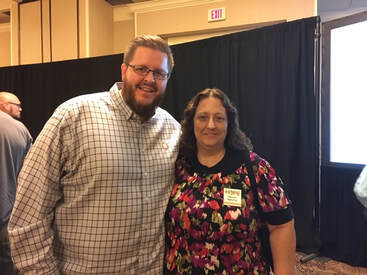|
Blanca Ramirez is a self-described advocate and friend to the bleeding disorders community, a role she has been passionate about for the last several years. However, this role presented itself through the course of life experience as she learned to navigate the diagnosis and treatment of herself, and again with her daughter, Cynthia. Blanca was a child living in a small town in Mexico when she started experiencing unexplained bruises and bleeds. She used her clothing to cover the bruises, but the bleeds could not be hidden. She says, “I couldn’t have friends because they thought I was contagious. They just didn’t understand.” Her initial diagnosis was anemia, but the nose bleeds and heavy periods eventually proved that to be incorrect. Her bleeds were so severe that she would get dizzy and weak and her biggest fear was that she would die from a bleed. There was no factor available at the time and transfusions were still the norm for treating bleeds. However, the clinic in her town did not carry blood and the closest hospital for which to receive a transfusion was nearly four hours away. She did her best to manage her bleeds and her pain. She says, “The pain is there, but I don’t really pay attention to it anymore. We women, we learn to deal with the pain.” Some years later, her daughter, Cynthia, who was a physically active child, experienced symptoms similar to her moms, with lots of bruising and an abnormal number of nosebleeds. In 1991, when Cynthia was five years old, she was diagnosed with von Willebrand’s disease. Her family had no knowledge of this disorder and the specialists and doctors in their small town in Texas could offer them little help. They endured many nights of nosebleeds and long hours at hospitals searching for answers from doctors who had no experience in treating bleeding disorders or awareness of effective treatment. This was exacerbated by the lack of moral support they received and understanding from their community. Blanca says, “von Willebrand’s disease was affecting our lives in a critical way.” One fateful trip to the hospital would soon change their fortune. Doctors were again baffled to find treatment and they were scheduled to spend the night in the hospital when they received a call from Dr. Howard Britton of Santa Rosa’s Children’s Hospital informing them that he was sending a helicopter to transfer them to his hospital for treatment. Blanca says, “Dr. Howard Britton was our saving angel. Our lives changed from that moment on.” To get the best treatment for Cynthia, Blanca’s family moved from Laredo to San Antonio in 2002. Blanca says, “The transition was not easy, but it was the right move.” Cynthia was finally getting the proper treatment and her health improved substantially. Their questions were answered, and they were receiving the moral support and compassion they had longed for but were missing from the medical community.
Blanca found herself wanting to learn more about von Willebrand’s disease and learned of the National Hemophilia Foundation and other organizations from hospital resources. NHF invited her to attend a conference one year, which sparked hesitation. She initially thought to decline the invitation, explaining, “I’m nobody. I’m just a mom. Everyone was a doctor, or a social worker, and I was just a mom with no experience.” Even after she arrived, she still had a difficult time recognizing her role. She says, “I wasn’t sure what I was doing there. I was out of place. I used to stand on the walls and the corners like a typical Mexican that doesn’t get in the way. Then I started learning and I started to realize that God put me there for a reason.” She joined NHF as an advocate to help other families. “I made it my goal to provide information about bleeding disorders to families in need, inform them of available resources, and provide moral support for patients and their families.” Blanca started to connect with other Latinos in the bleeding disorders community, helping them to develop relationships with each other and have confidence in themselves. Once recognized as a leader amongst the Latino community, she was asked to speak to them at a conference and she says her message was simply, yet powerfully, “Don’t feel like you don’t belong here. You’re part of us. You belong here.” Blanca has since joined several organizations for bleeding disorders, met many representatives, and acquired knowledge of resources for the bleeding disorders community. She leads a support group for the Hispanic community at Hope Charities, an achievement she holds near and dear. She says, “Hope group is my heart. It’s my family. Mi familia.” Her passion also lies with her work in advocating for women in the von Willebrand’s community and prioritizing the needs of Latinos within the bleeding disorders community. She is proud of the advances that have recently taken place but says that there is still more work to do. Her words of encouragement for women are, “Fight; have a voice. You have a place in the world.” Regarding the Latino community as a whole, Blanca says, “We need to understand their needs so we can be their voices. They need to start feeling like they have a home, a place to go. We need to be more friendly to them.” Although being a patient, a mother to a child with a bleeding disorder, and an advocate to the bleeding disorders community has been a challenge, it has also been a largely positive experience. Blanca says, “Meeting so many families across the country and professional and medical staff has been a blessing. Continuing to fight to improve the lives of the bleeding disorders community is my goal.” |
Hope Charities
|
Live Chat Support
×
Connecting

You:
::content::
::agent_name::
::content::
::content::
::content::

 RSS Feed
RSS Feed